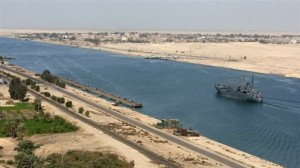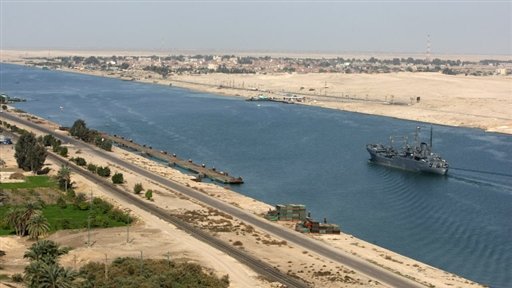
(AFP Photo)
By Islam Atrees
The transitional government of Dr. Hazem El-Beblawi announced that it will develop the Suez Canal corridor as a national project for Egypt in the coming period. The Cabinet has assigned the Suez Canal Authority (SCA) to be the authority for the project’s execution owing to its global status.
Lieutenent General Mohab Memish, chairman of the SCA, said the project will be presented to the Cabinet in its final form for approval, as the appropriate first step in the planning stage for the project’s implementation. He explained that in the project’s initial phase, they will prepare all information related to it, prior to presenting it to consulting firms with international experience. These firms will prepare a master plan focusing on the huge potential of ports such as those in eastern Port Said, Ain Sukhna, near the Suez Canal and in the northern industrial zone northwest of Suez.
Dr Khalid Hanafi, Dean of the College of International Transport and Logistics at the Arab Academy for Maritime Transport and a member of the advisory group led by Dr Essam Sharaf, says that there are teams of experts and global consulting firms interested in the project. He declined to name the firms, but said that they include two from the United States and one each from the Netherlands, Germany and China. He says that many investors and major international companies have revealed plans to enter the bidding on the Suez Canal development project and have asked about the deadlines for submission of their substantial projects.
Concerning the logistics, Hanafi added that representatives from those firms have addressed him, on account of his being a member of the national advisory group for the canal development project, and expressed a desire to enter the bidding for projects that will be launched soon. He added that foreign investors have strong incentives to invest in Egypt.
Hanafi also stressed that the Suez Canal development project will be the engine of the Egyptian economy in the coming period, and called on the government to begin seeking studies related to the project from these consulting firms. He supports the adoption of the canal development project as a national project, and requested that the advisory group aiding Dr Sharaf be officially commissioned to finish all the necessary studies and present the projects to investors.
Hanafi revealed that the government has “orally,” as he put it, appointed Sharaf’s advisory group with the supervision of the canal development project, and the group is merely awaiting official commissioning. El-Beblawi called the members of the advisory group and told them to be prepared, and their official commissioning is expected in the next few days. This commissioning, Hanafi added, is necessary for the group to get to work on the ground, but unfortunately, the current political situation has caused a great deal of confusion concerning the canal project.
He underscored that the delay of the studies and projects for the Suez Canal corridor is not in the national interest, because other countries aim to take Egypt’s share of global shipping by developing their own rail and road trade routes. According to Hanafi, this delay has lasted more than five years, and this threatens the project’s benefits.
Hanafi described the government and state agencies as immersed in ongoing political issues, a means through which the enemies of Egyptian society aim to distract the attention that must be paid to Egypt’s economy. He emphasised that the state is in dire need of large projects like this, which will help pick them up from their dilemma. Hanafi said that responsibility of the SCA for the Suez Canal development project is highly appropriate, considering the SCA’s long experience in nautical and logistical matters.
He also stressed that studies of the eastern Port Said region need minor adjustments, but otherwise, the entire region is ready for launch as soon as possible. However, he emphasised the necessity of making the master plan for the project fully available before work begins. Hanafi explained that the Dutch consulting firm DHV completed their study of the eastern Port Said region back in 2008, and this study must be must be integrated with the studies of the other areas in the Canal zone, including the north western part of the Gulf of Suez.
Regarding the government’s intention to put the project before international consulting firms, Hanafi said that this does not conflict with the work of the national advisory group led by Sharaf, and in fact, the opposite is true: the advisory group’s work will not be displaced. The group will put the outline of the project before the firm, and the firm shall work under the group’s authority. He added that the presence of the global consulting firms adds value because it casts the studies that the advisory group will issue with a global character, which will aid in attracting investors of many nationalities.
Tahir Hazeen, the legal adviser of the advisory group, said that El-Beblawi met in the past few days with Sharaf, and told him that his group must be prepared soon for it official commissioning from the Cabinet.
He added that the group does not know, up to this point, whether the SCA will manage the project or whether it will establish a separate organisation to do so, and if so, whether it will be derived from the SCA or independent, with its own organisational and administrative structure.
Hazeen indicated that the role that must be entrusted to the SCA is supervising the implementation of the master plan, which Sharaf’s advisory group will begin finalising immediately upon the issuance of their official commissioning from the government. He further pointed out that the Cabinet has not officially tasked the group up to this point with the supervision of the Suez Canal development project.
Hazeen explained that there is a lack of clarity regarding the bodies that will implement the Suez Canal project, and that it lacks a clear roadmap. He expressed his annoyance and that of the advisory group with the delay of the studies and investment projects in the area, and stressed that this period surely witnessed the development of projects in other countries that aim to compete with the Suez Canal’s high volume of trade and excellent geographic location.
Hazeen requested the speedy passage of a law for the development of the Suez Canal. This law ought to establish of a free trade zone and ports that are not bound by normal regulations for investment, trade, or manufacturing, in so far as this does not harm national security. He pointed out that a restrictive investment climate always makes investors flee.
He added that any law, upon its passage, must reflect the technical reality and take into account financial and security implications. He contrasted this with the example of the investment law for the Ain Sokhna port, which was intended to compete with the Jebel Ali port in Dubai. However, the law that was issued for that area did not meet the aspirations of the Egyptian people.
Hazeen also said that the Suez Canal Development Project will likely not be delayed after this point, and that waiting at least nine months for the election of the People’s Assembly and discussion of the law, and then its passage, will not be in the project’s interest whatsoever. He suggested that the presidency issue a constitutional declaration that includes the development law for the project as a possible solution for expediting the bidding process for studies of the remaining projects.
Hazeen also mentioned that the Suez Canal corridor project, as envisioned by Sharaf’s advisory group, includes establishing a harbour in eastern Port Said with an industrial focus aimed at producing exports. This is in addition to building an infrastructure of electrical stations, roads, bridges and sewage. He proposed that this be funded through public underwriting or bonds, and that the rate of funding not be less than 80% of the value of the infrastructure projects.
The advisory group’s vision also includes companies and global brands establishing factories in the Canal Zone on their own. In these projects, the rate of funding will not exceed 20%. Hazeen added that the group has numerous other ideas up its sleeve to be taken up during the project’s implementation.




